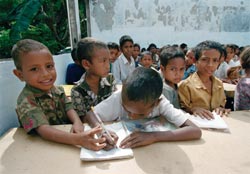|
14. ICT applications can support sustainable development, in the fields of public
administration, business, education and training, health, employment, environment,
agriculture and science within the framework of national e-strategies. This would include
actions within the following sectors:
15.
E-government
a) Implement e-government strategies focusing on applications aimed at innovating
and promoting transparency in public administrations and democratic processes, improving efficiency and strengthening relations with citizens.
b) Develop national e-government initiatives and services, at all levels, adapted to
the needs of citizens and business, to achieve a more efficient allocation of resources
and public goods.
c) Support international cooperation initiatives in the field of e-government, in order
to enhance transparency, accountability and efficiency at all levels of government.
16. E-business
a) Governments, international organizations and the private sector, are
encouraged to promote the benefits of international trade and the use of
e-business, and promote the use of e-business models in developing
countries and countries with economies in transition.
b) Through the adoption of an enabling environment, and based on widely available
Internet access, governments should seek to stimulate private sector investment,
foster new applications, content development and public/private partnerships.
c) Government policies should favour assistance to, and growth of SMEs, in the ICT
industry, as well as their entry into e-business, to stimulate economic growth and job
creation as elements of a strategy for poverty reduction through wealth creation.
 17. E-learning (see
section C4) 17. E-learning (see
section C4)
18. E-health
a) Promote collaborative efforts of governments, planners, health professionals, and
other agencies along with the participation of international organizations for creating
reliable, timely, high-quality and affordable health care and health information
systems and for promoting continuous medical training, education, and research
through the use of ICTs, while respecting and protecting citizens’ right to privacy.
b) Facilitate access to the world’s medical knowledge and locally relevant content
resources for strengthening public health research and prevention programmes and
promoting women’s and men’s health, such as content on sexual and reproductive
health and sexually transmitted infections, and for diseases that attract full attention
of the world, including HIV/AIDS, malaria and tuberculosis.
c) Alert, monitor and control the spread of communicable diseases, through the
improvement of common information systems.
d) Promote the development of international standards for the exchange of health
data, taking due account of privacy concerns.
e) Encourage the adoption of ICTs to improve and extend health care and health
information systems to remote and underserved areas and vulnerable populations,
recognizing women’s roles as health providers in their families and communities.
f) Strengthen and expand ICT-based initiatives for providing medical and humanitarian
assistance in disasters and emergencies.
19. E-employment
a) Encourage the development of best practices for e-workers and e-employers built,
at the national level, on principles of fairness and gender equality, respecting all relevant international norms.
b) Promote new ways of organizing work and business with the aim of raising
productivity, growth and well-being through investment in ICTs and human
resources.
c) Promote teleworking to allow citizens, particularly in the developing countries,
LDCs, and small economies, to live in their societies and work anywhere, and to
increase employment opportunities for women, and for those with disabilities. In
promoting teleworking, special attention should be given to strategies promoting job
creation and the retention of the skilled working force.
d) Promote early intervention programmes in science and technology that should
target young girls to increase the number of women in ICT carriers.
20. E-environment
a) Governments, in cooperation with other stakeholders, are encouraged to use and
promote ICTs as an instrument for environmental protection and the sustainable
use of natural resources.
b) Government, civil society and the private sector are encouraged to initiate
actions and implement projects and programmes for sustainable production and
consumption and the environmentally safe disposal and recycling of discarded
hardware and components used in ICTs.
c) Establish monitoring systems, using ICTs, to forecast and monitor the impact of
natural and man-made disasters, particularly in developing countries, LDCs and
small economies.
21. E-agriculture
a) Ensure the systematic dissemination of information using ICTs on agriculture,
animal husbandry, fisheries, forestry and food, in order to provide ready access to
comprehensive, up-to-date and detailed knowledge and information, particularly in
rural areas.
b) Public-private partnerships should seek to maximize the use of ICTs as an
instrument to improve production (quantity and quality).
22. E-science
a) Promote affordable and reliable high-speed Internet connection for all universities
and research institutions to support their critical role in information and knowledge
production, education and training, and to support the establishment of partnerships,
cooperation and networking between these institutions.
b) Promote electronic publishing, differential pricing and open access initiatives to make scientific information affordable and accessible in all countries on an equitable
basis.
c) Promote the use of peer-to-peer technology to share scientific knowledge and
pre-prints and reprints written by scientific authors who have waived their right to
payment.
d) Promote the long-term systematic and efficient collection, dissemination
and preservation of essential scientific digital data, for example, population and
meteorological data in all countries.
e) Promote principles and metadata standards to facilitate cooperation and effective
use of collected scientific information and data as appropriate to conduct scientific
research.
|



